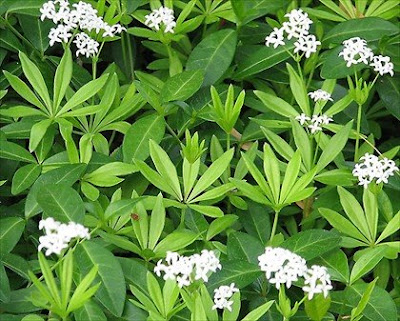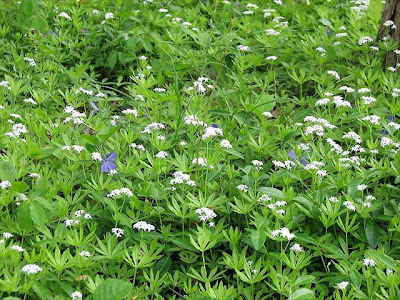Garden Diary: Two Exotic Groundcovers

Sweet woodruff (Galium odoratum) and myrtle (Vinca minor) make a striking carpet at this time of the year. The myrtle has been in bloom for about a month. Only in the past week have the colonies of Sweet woodruff popped into bloom. Both are considered invasive exotics, but at Federal Twist they coexist happily, seemingly without affecting the native carexes, the numerous seedling trees, or the highly invasive, but native, poison ivy.
I know the myrtle was introduced over 40 years ago because William Hunt's architectural plans called for extensive plantings to control erosion on the steep banks surrounding the house, which was built in 1965. I welcome its periwinkle blue flowers every spring, especially in the wilder woods in front of the house. I have no idea when the Sweet woodruff was introduced; it has formed several distinct colonies that, I admit, seem to grow a little larger each year.
 The thick mats of mixed myrtle and Sweet woodruff remind me of William Martin's "layering" planting technique, as he described it in his Vista lecture recently in London (see post below). At his well known garden, Wigandia, in Australia, he gardens on the side of a volcano, in soil and environmental conditions vastly different from mine. His technique does not involve horizontal, visual layering of plants as in a border, but rather vertical layering. He covers the ground thickly with a low, even "thuggish" (to use his word) kind of planting, then grows the larger, more structural plants through the layer covering the ground. I was happy to hear his description because I'm trying to use a similar technique in my garden on Federal Twist Road.
The thick mats of mixed myrtle and Sweet woodruff remind me of William Martin's "layering" planting technique, as he described it in his Vista lecture recently in London (see post below). At his well known garden, Wigandia, in Australia, he gardens on the side of a volcano, in soil and environmental conditions vastly different from mine. His technique does not involve horizontal, visual layering of plants as in a border, but rather vertical layering. He covers the ground thickly with a low, even "thuggish" (to use his word) kind of planting, then grows the larger, more structural plants through the layer covering the ground. I was happy to hear his description because I'm trying to use a similar technique in my garden on Federal Twist Road.The mat of Sweet woodruff and myrtle is one preexisting example of this "layering" technique given to me by Edith Howeth, the first and previous gardener at Federal Twist. I'm experimenting with other combinations in the main garden at back, where conditions are different - more open, very wet, and sunny.

James Golden